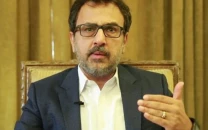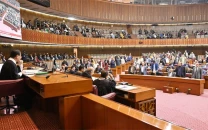Visit from down under: Australian official links investment to internal security
Australian senator concludes two-day visit to Pakistan.

Australian senator concludes two-day visit to Pakistan. PHOTO: FILE
If Pakistan resolves its security issues, it could pave the way for Australian private firms to invest in its energy sector and for more two-way student exchanges, according to Senator Brett Mason, Australia’s Parliamentary Secretary to the Minister of Foreign Affairs.
Mason, who was on a two-day official visit to Pakistan, was speaking at a reception organised by the Australian High Commission in Islamabad on Wednesday at a local hotel.
The senator’s visit marked the first official meetings between the Australian and Pakistani governments. Both Australia and Pakistan held general elections earlier in 2013, with the Liberal National Party coalition forming the new federal government down under.

At the reception, Mason, whose official position is the equivalent of a deputy foreign minister, said Australia takes Pakistan “very, very seriously” and wants to continue strengthening bilateral military, strategic and educational links.
“Australia and Pakistan have a longstanding and warm friendship,” he said. “I am here on behalf of Australia’s Foreign Minister Julie Bishop to say that we want this to continue.”
Mason, however, did point out the importance of Pakistan’s internal security to the country’s future prosperity.
“Whether it is economic growth or widening the tax base, much of it resolves around security issues,” he said. “Once Pakistan is able to resolve them, the country can realise its immense potential.”
He said Pakistan is the 10th largest provider of students for Australia and said he would like Australian students to study at Pakistani institutions once the security situation has improved.
“Bet you can’t wait for that,” he said, joking about Australian students visiting Pakistan.
The senator also mentioned that Australian private companies are interested in investing in Pakistan’s energy sector but the investors’ confidence, again, depends on enhanced security and stability within Pakistan.
During his visit, Mason met with Prime Minister’s Special Assistant on foreign policy Tariq Fatemi, the Prime Minister’s Adviser on National Security and Foreign Affairs Sartaj Aziz, and Foreign Secretary Jalil Jilani. He also met his cricketing hero Imran Khan, the leader of the Pakistan Tehreek-e-Insaf.

Mason said he observed that Pakistani officials recognised the security issues and challenges they might face in resolving the issues. But he said he noticed they were willing to resolve the problems. The new Australian government, he said, wants to ensure continued cooperation in priority areas such as counterterrorism and policing.
The Australian senator also visited Khyber-Pakhtunkhwa to see school and home-based early childhood initiatives supported by the Australian Aid Programme. Mason appreciated the work and said Australia will continue to help Pakistan in transforming the lives of schoolchildren.
Australian High Commissioner Peter Heyward said Senator Mason’s visit underscores the importance Australia accords to its relationship with Pakistan. He said the new Australian foreign minister also intends to visit Pakistan during her first year in office.
The reception also provided a chance for the Australian High Commission to bid farewell to Bazl Khan, Australia’s Honourary Consul to Karachi, and welcome Khan’s successor, Farrukh Ikram.
Heyward said Khan has represented Australia’s interests in Sindh since 1998 and has served with distinction while Australia expanded its development and trade links with the province over the 15-year period.
The ceremony was attended by members of the Pakistan government, the business community and members of Islamabad’s diplomatic community.
Published in The Express Tribune, November 8th, 2013.



















COMMENTS
Comments are moderated and generally will be posted if they are on-topic and not abusive.
For more information, please see our Comments FAQ